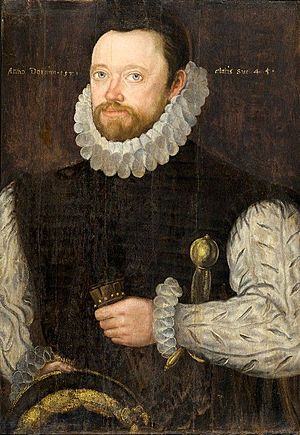Reginald Scot facts for kids
Quick facts for kids
Reginald Scot
|
|
|---|---|

Reginald Scot
|
|
| Born | 1538 |
| Died | 9 October 1599 (aged 60–61) England
|
| Occupation | Author, politician |
| Known for | The Discoverie of Witchcraft |
Reginald Scot (born around 1538 – died October 9, 1599) was an English writer and a member of Parliament. He is most famous for his book, The Discoverie of Witchcraft, which was published in 1584. In this book, he argued that witchcraft was not real. He also explained how some seemingly magical tricks were actually just clever illusions. Because of this, his book is often seen as one of the first guides to conjuring or performing magic tricks.
Contents
Reginald Scot's Life
Reginald Scot was born in England around 1538. His family was from Kent, a county in England. His father passed away when Reginald was young.
Early Life and Education
When he was about 17, Scot went to Hart Hall, Oxford University. However, he left without finishing his degree. Even though he didn't become a lawyer, his writings show he knew a lot about law.
He spent most of his life in his home county of Kent. He was an active country gentleman, which meant he managed his family's land and helped with local affairs. He also helped his cousin, Sir Thomas Scot, who was a kind supporter.
Public Service
Reginald Scot was involved in local government. He collected taxes for his area in 1586 and 1587. He also served as a captain for local soldiers in 1588. In 1588–89, he was elected to Parliament as a representative for New Romney. He was likely also a local judge, known as a justice of the peace.
Family and Later Years
Reginald Scot married Jane Cobbe in 1568. They had a daughter named Elizabeth. Later, he married a second wife, Alice Collyar.
Reginald Scot wrote his own will on September 15, 1599. He passed away on October 9, 1599, in Smeeth, England. He was probably buried in the church of St. Mary the Virgin in Brabourne, next to his first wife.
Reginald Scot's Beliefs
In his famous book, The Discoverie of Witchcraft, Scot shared his strong beliefs. He was a Protestant and believed that God was in charge of everything, including natural events like thunder and storms. He argued that these were not caused by witches or devils.
Scot strongly disagreed with the idea that witches could get real supernatural powers from the devil. He criticized books like Malleus Maleficarum, which was a guide for hunting witches. He believed that the fear of witches was wrong and that many supposed acts of witchcraft were either tricks or misunderstandings.
Reginald Scot's Writings
About Growing Hops
In 1574, Reginald Scot published a book called Perfect Platform of a Hop-garden. This book was about how to grow hops, which are plants used to make beer. It was the first practical guide on hop farming in England and included pictures to explain the process.
About Witchcraft and Magic
Reginald Scot's most important work was The Discoverie of Witchcraft. He spent a lot of time researching for this book, reading works by many different authors. He studied how people believed in witchcraft in courts and villages.
His main goal was to show that the belief in witchcraft and magic was not supported by logic or religion. He argued that what people thought were spiritual events were actually either clever tricks by people or just illusions caused by people's minds.
A very interesting part of his book explains how to do many conjuring and sleight of hand tricks in detail. This is why his book is often called the first textbook on magic tricks.
 | Delilah Pierce |
 | Gordon Parks |
 | Augusta Savage |
 | Charles Ethan Porter |

